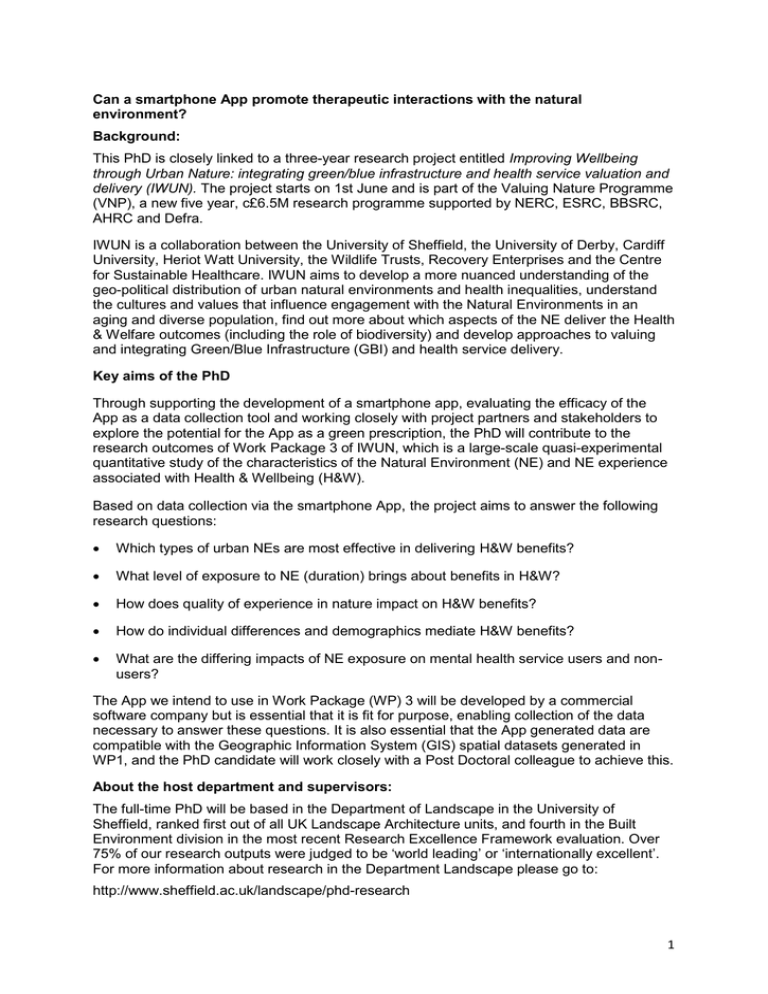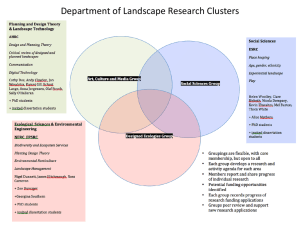Improving Wellbeing environment? Background:
advertisement

Can a smartphone App promote therapeutic interactions with the natural environment? Background: This PhD is closely linked to a three-year research project entitled Improving Wellbeing through Urban Nature: integrating green/blue infrastructure and health service valuation and delivery (IWUN). The project starts on 1st June and is part of the Valuing Nature Programme (VNP), a new five year, c£6.5M research programme supported by NERC, ESRC, BBSRC, AHRC and Defra. IWUN is a collaboration between the University of Sheffield, the University of Derby, Cardiff University, Heriot Watt University, the Wildlife Trusts, Recovery Enterprises and the Centre for Sustainable Healthcare. IWUN aims to develop a more nuanced understanding of the geo-political distribution of urban natural environments and health inequalities, understand the cultures and values that influence engagement with the Natural Environments in an aging and diverse population, find out more about which aspects of the NE deliver the Health & Welfare outcomes (including the role of biodiversity) and develop approaches to valuing and integrating Green/Blue Infrastructure (GBI) and health service delivery. Key aims of the PhD Through supporting the development of a smartphone app, evaluating the efficacy of the App as a data collection tool and working closely with project partners and stakeholders to explore the potential for the App as a green prescription, the PhD will contribute to the research outcomes of Work Package 3 of IWUN, which is a large-scale quasi-experimental quantitative study of the characteristics of the Natural Environment (NE) and NE experience associated with Health & Wellbeing (H&W). Based on data collection via the smartphone App, the project aims to answer the following research questions: Which types of urban NEs are most effective in delivering H&W benefits? What level of exposure to NE (duration) brings about benefits in H&W? How does quality of experience in nature impact on H&W benefits? How do individual differences and demographics mediate H&W benefits? What are the differing impacts of NE exposure on mental health service users and nonusers? The App we intend to use in Work Package (WP) 3 will be developed by a commercial software company but is essential that it is fit for purpose, enabling collection of the data necessary to answer these questions. It is also essential that the App generated data are compatible with the Geographic Information System (GIS) spatial datasets generated in WP1, and the PhD candidate will work closely with a Post Doctoral colleague to achieve this. About the host department and supervisors: The full-time PhD will be based in the Department of Landscape in the University of Sheffield, ranked first out of all UK Landscape Architecture units, and fourth in the Built Environment division in the most recent Research Excellence Framework evaluation. Over 75% of our research outputs were judged to be ‘world leading’ or ‘internationally excellent’. For more information about research in the Department Landscape please go to: http://www.sheffield.ac.uk/landscape/phd-research 1 The PhD will be supervised by Dr Olaf Schroth in the Department of Landscape and Dr Miles Richardson, Head of the Department of Psychology at the University of Derby. Dr Olaf Schroth is a Lecturer in Landscape planning, specialising in developing and testing technologies for environmental modeling and landscape visualisation. https://www.sheffield.ac.uk/landscape/staff/profiles/oschroth/profilenew Dr Miles Richardson is Head of Psychology, Deputy Head of Life Sciences and leads the Nature Connectedness Research Group at the University of Derby. http://www.derby.ac.uk/staff/miles-richardson/ Entry criteria: Applicants should have minimum of a 2:1 first degree in a relevant discipline/subject area or a Masters in a relevant discipline/subject area. The Masters must have been attained with overall marks at merit level (60%). In addition, the dissertation or equivalent element in the Masters must also have been attained with a mark at merit level (60%). Applicants should demonstrate an understanding of human responses to NEs and the implications for health and well-being, as well as a keen interest in the development of information technology in the health/NE interface. Skills in the use of GIS and spatial data and/or previous experience of software design and smartphone App development are desirable. Applicants should be well-organised, highly motivated individuals with excellent communication skills, as robust methodology and technical ability will need to be matched with a flair for information presentation and dissemination. Fees and student stipend: Applications are open to UK, EU and international students but University fees will only be waived up to the UK/EU maximum. A stipend starting at £14,296 and rising in line with RCUK rates will be awarded annually. To find out more please email the Director of Research Anna Jorgensen a.jorgensen@sheffield.ac.uk or the PhD supervisor Olaf Schroth o.schroth@sheffield.ac.uk You can apply online here: http://www.sheffield.ac.uk/postgraduate/research/apply/applying 2


